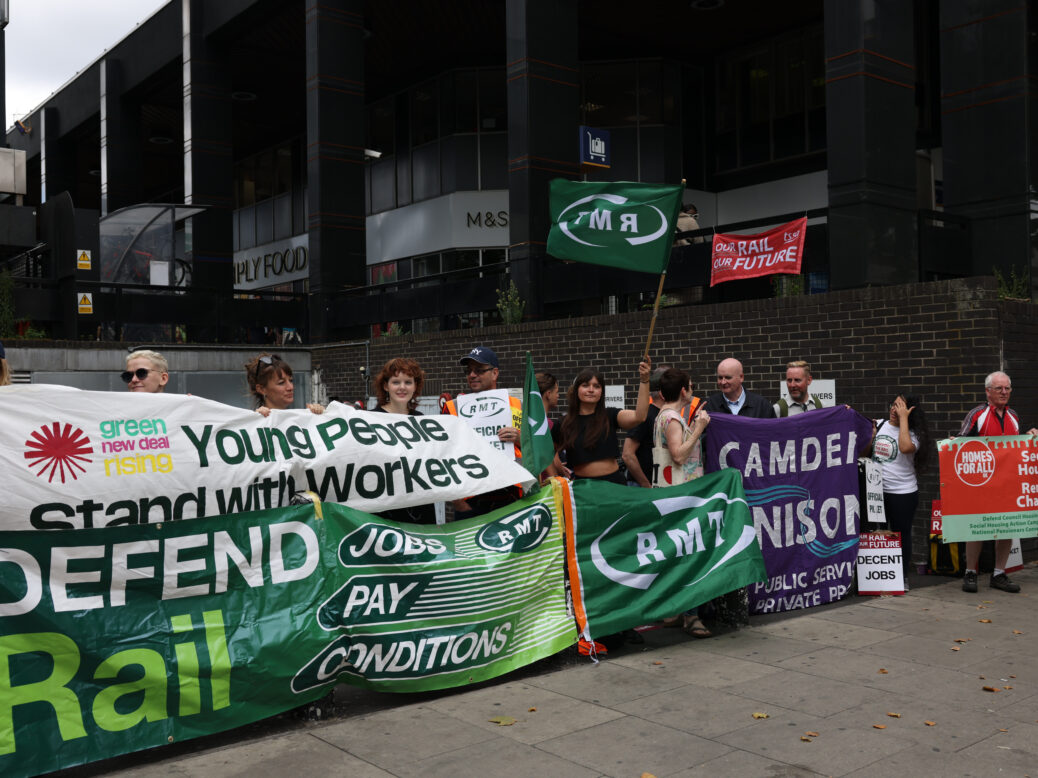
A summer of strikes in Britain, most notably led by the Rail, Maritime and Transport Workers (RMT) union, came to an American-tinged conclusion with US senator Bernie Sanders attending a rally held by RMT to protest the contentious long-term funding deal struck between the government and Transport for London (TfL).
“I want to convey to you my belief that millions of working people throughout this country are proud of what you are doing,” Sanders told a packed audience in a stuffy hall at the Trades Union Congress (TUC) headquarters in central London yesterday (31 August). “What is going on today in the UK is no different than what is going on in the United States of America. Same bloody thing.”
The £1.2bn deal, agreed after a secret month-long negotiation, will run to 2024. It comes with caveats, however, and TfL will have to make budget cuts of at least £230m over the next two years to meet the conditions of the agreement. In a statement, RMT boss Mick Lynch labelled the deal as “unacceptable”, adding that the agreement will “attack Tube workers’ pay and pensions and will lead to further strike action”.
TfL was plunged into financial uncertainty due to the pandemic, when passenger commutes – the proceeds from which make up 72 per cent of TfL’s funding – ended suddenly, while in 2015, during his final year in office as London mayor, Boris Johnson ended TfL’s near-£600m government operating grant, making the service completely self-reliant. Over the past two years, the government and bosses at London’s transport network agreed four emergency short-term funding deals (totalling over £5bn) to keep TfL going, with both sides toing and froing over the details of a long-term funding plan.
Previous negotiations have been so fraught and tense that some deals were struck mere hours before the funding period for the previous arrangement ran out.
On the latest agreement, Transport Secretary Grant Shapps said that it “more than delivers for Londoners”. Sadiq Khan, the mayor of London, meanwhile, said the arrangement was “far from ideal”.
[See also: Train strikes create far less disruption for passengers than government policy]
“This is not the end of this process… this has still got a lot further to run,” Nick Bowes, who was Khan’s director of policy from 2016 to 2021 and is now head of the Centre for London think tank, told Spotlight. “The main reason for that is [the deal] still leaves quite a big hole in the budget that TfL has got to find in one way or another – either through efficiencies or through cuts. It’s not just a couple of million pounds – we’re talking hundreds of millions of pounds.”
The DfT is keen to stress that the new deal matches the Mayor’s own pre-pandemic spending plans, and that many of TfL’s infrastructure projects – including new Piccadilly Line trains, the extension of the Northern Line, as well as upgrades to other lines – will continue as planned. But the network, in addition to saving hundreds of millions over the next two years, bowed to pressure from the government to bring forward plans to introduce driverless trains and to reform pensions. These concessions had previously been subject to strong opposition.
In a statement following the deal’s announcement, Khan acknowledged that the savings TfL will have to make will likely lead to fare rises and cuts to bus services, adding that the “onerous strings” attached to the agreement by the government “could well lead to more industrial action and more disruption for commuters”.
With the government holding the purse strings, and TfL needing the money, it was “never going to be a negotiation of equals”, says Bowes, who believes that in addition to major cuts to bus services, TfL will try to make savings by increasing fares and by expanding the network’s commercial powers, including utilising its large property portfolio.
“The TfL funding situation, from the government’s perspective, is wrapped up in a much bigger agenda around levelling up and the focus on Red Wall seats,” he says. “London is of national political insignificance to the government, their majority… came from the Midlands and the north… There’s votes to be had in those parts of the country by being hard and tough on London and giving them a kicking. So you need to look at the TfL funding situation in that context.”
The RMT rally in reaction to the deal was attended – in person and virtually – by a few Labour MPs including Nadia Whittome and Marsha de Cordova, a few weeks after party leader Keir Starmer told his shadow cabinet to stay away from picket lines (only for Lisa Nandy, the shadow levelling-up, housing and communities secretary, to attend a Communication Workers Union protest).
“Sadiq Khan, the London Labour Party, the national Labour Party… where are they out in the campaigns, fighting against cuts themselves?” RMT’s Lynch asked during his speech.
“When workers go into struggle,” the former shadow chancellor, John McDonnell, began during his speech at the event, “there can be no doubt the role of a Labour MP – front-bench or back-bench – is on that picket line,” he said, to rousing applause.
“There’s a momentum building behind this campaign,” McDonnell later told Spotlight. “You can understand why – the cuts to TfL are so fundamental to the quality of life in London… I actually think we’ll win as well and push [the] government back.”
[See also: Why OnlyFans wants us to regulate the internet]




